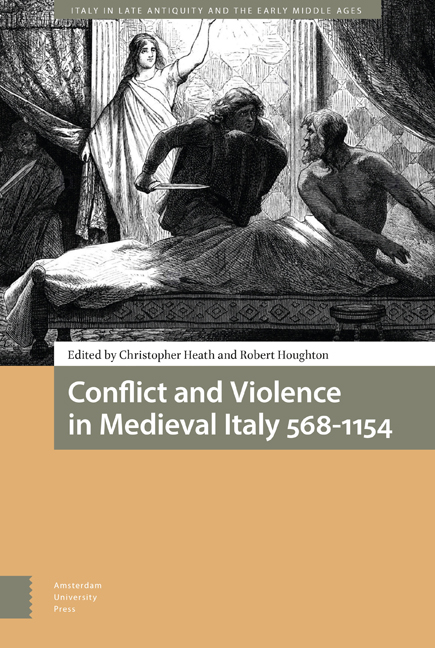Book contents
- Frontmatter
- Table of Contents
- Abbreviations
- Preface
- 1 Introduction: Discordant Minds and Hostile Nations
- 2 Morbidity and Murder: Lombard Kingship’s Violent Uncertainties 568-774
- 3 Insurgency and Counterinsurgency in Lombard Italy (c600-700)
- 4 Troubled Times: Narrating Conquest and Defiance between Charlemagne and Bernard (774-818)
- 5 ‘Nec patiaris populum Domini ab illis divinitus fulminandis Agarenis discerpi’: Handling ‘Saracen’ Violence in Ninth-Century Southern Italy
- 6 Formosus and the ‘Synod of the Corpse’: Tenth Century Rome in History and Memory
- 7 Sex, Denigration and Violence: A Representation of Political Competition between Two Aristocratic Families in Ninth Century Italy
- 8 ‘Italy and her [German] Invaders’: Otto III’s and Frederick Barbarossa’s Early Tours of Italy – Pomp, Generosity and Ferocity
- 9 ‘I Predict a Riot’: What Were the Parmense Rebelling Against in 1037?
- 10 The Strange Case of Deusdedit and Pandulf: Two Accounts of Honorius II’s Election
- Afterword
- Index
Preface
Published online by Cambridge University Press: 07 September 2022
- Frontmatter
- Table of Contents
- Abbreviations
- Preface
- 1 Introduction: Discordant Minds and Hostile Nations
- 2 Morbidity and Murder: Lombard Kingship’s Violent Uncertainties 568-774
- 3 Insurgency and Counterinsurgency in Lombard Italy (c600-700)
- 4 Troubled Times: Narrating Conquest and Defiance between Charlemagne and Bernard (774-818)
- 5 ‘Nec patiaris populum Domini ab illis divinitus fulminandis Agarenis discerpi’: Handling ‘Saracen’ Violence in Ninth-Century Southern Italy
- 6 Formosus and the ‘Synod of the Corpse’: Tenth Century Rome in History and Memory
- 7 Sex, Denigration and Violence: A Representation of Political Competition between Two Aristocratic Families in Ninth Century Italy
- 8 ‘Italy and her [German] Invaders’: Otto III’s and Frederick Barbarossa’s Early Tours of Italy – Pomp, Generosity and Ferocity
- 9 ‘I Predict a Riot’: What Were the Parmense Rebelling Against in 1037?
- 10 The Strange Case of Deusdedit and Pandulf: Two Accounts of Honorius II’s Election
- Afterword
- Index
Summary
The papers published in this volume were originally presented at the International Medieval Congress in a surprisingly hot July in Leeds in 2016. The theme of the two sessions held on the Wednesday morning of the congress was ‘Murder and Mayhem: Disorder and Violence in Italy, 568-1154’. Seven of the contributions presented for the first time on that day are seen here in considerably revised form. The editors also sought and acquired additional papers from Guido Berndt, Kordula Wolf and David Barritt.
The nine essays collated here represent ongoing research and work into the mechanisms and mechanics of the socio-cultural worlds of Italy from the advent of the Lombards in c.568 up to the ascendancies of the Normans in Sicily and the Staufen emperors in the Kingdom of Italy through the prism offered by violence, disorder and discontent. As we indicate in the Introduction which follows, and which considers the essays themselves and the historiographical landscapes, this volume is not a ‘grammar’ of violence, and in most respects, it is not the violence per se that holds interest, but rather the methods by which Medieval Italian societies coped, contained and continued despite that violence.
Since 2016, the essays have been refined, amended and re-amended. It is to the eternal credit of the contributors, who submitted their work on time and to schedule, that they patiently endured the lacuna between presentation, preparation and production with such equanimity as the editors strove to bring forward the complete manuscript. In this respect the volume rests upon a cumulative value where, whilst all the contributions consider issues in particular contexts, the accumulated aspects of the issues tackled reveal both the fluidity and the inventiveness of Italian societies as they grappled with the impact of violence on the ground.
Our thanks then must go to the contributors here in the first place; secondly, to Professor Balzaretti who in the midst of considerable responsibilities as Head of History at the University of Nottingham completed the Afterword; thirdly, to the Commissioning Editor at Amsterdam University Press, Dr Erin Dailey whose gentle but effective management of the project brought the end-product to its’ conclusion; and to Dr Vicki Blud who has efficiently assisted the editors in the final stage of production in the midst of a pandemic that shows no sign of dissipation.
- Type
- Chapter
- Information
- Conflict and Violence in Medieval Italy 568-1154 , pp. 9 - 10Publisher: Amsterdam University PressPrint publication year: 2021



